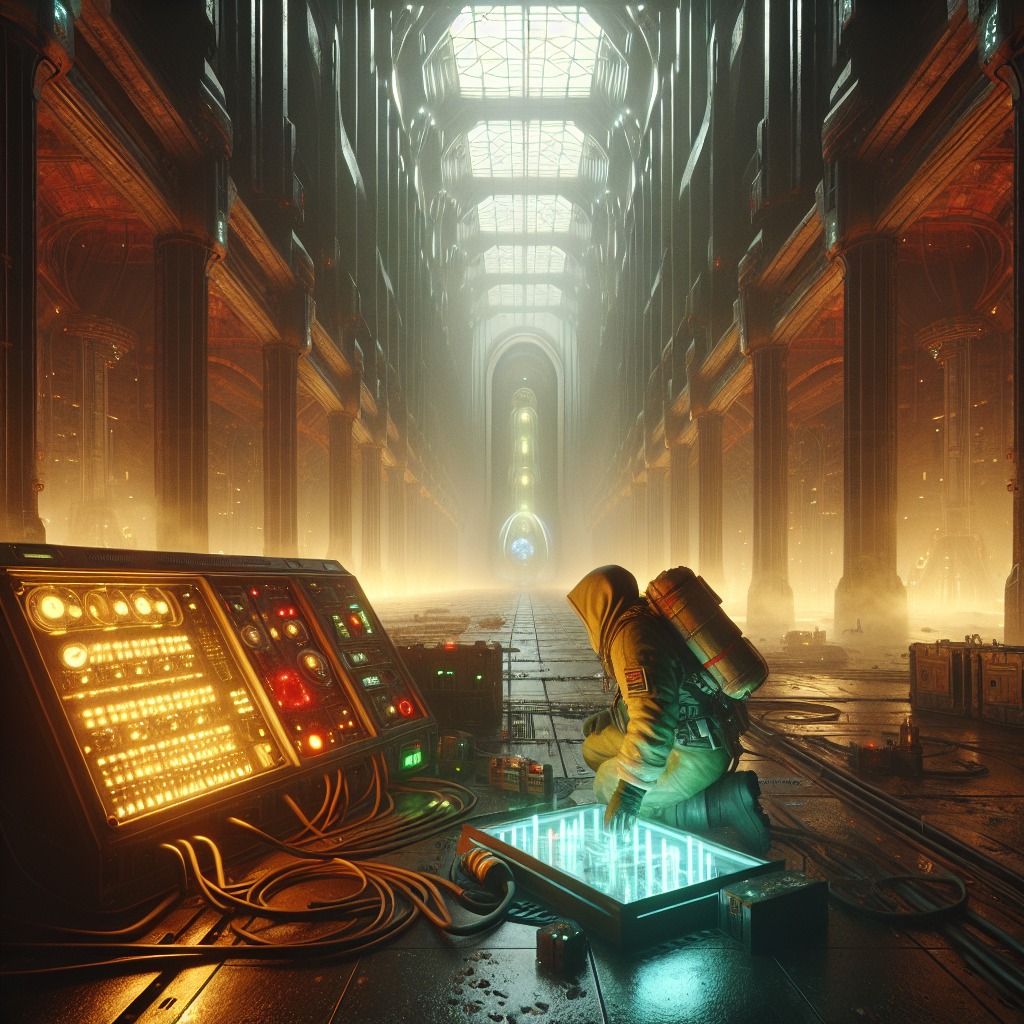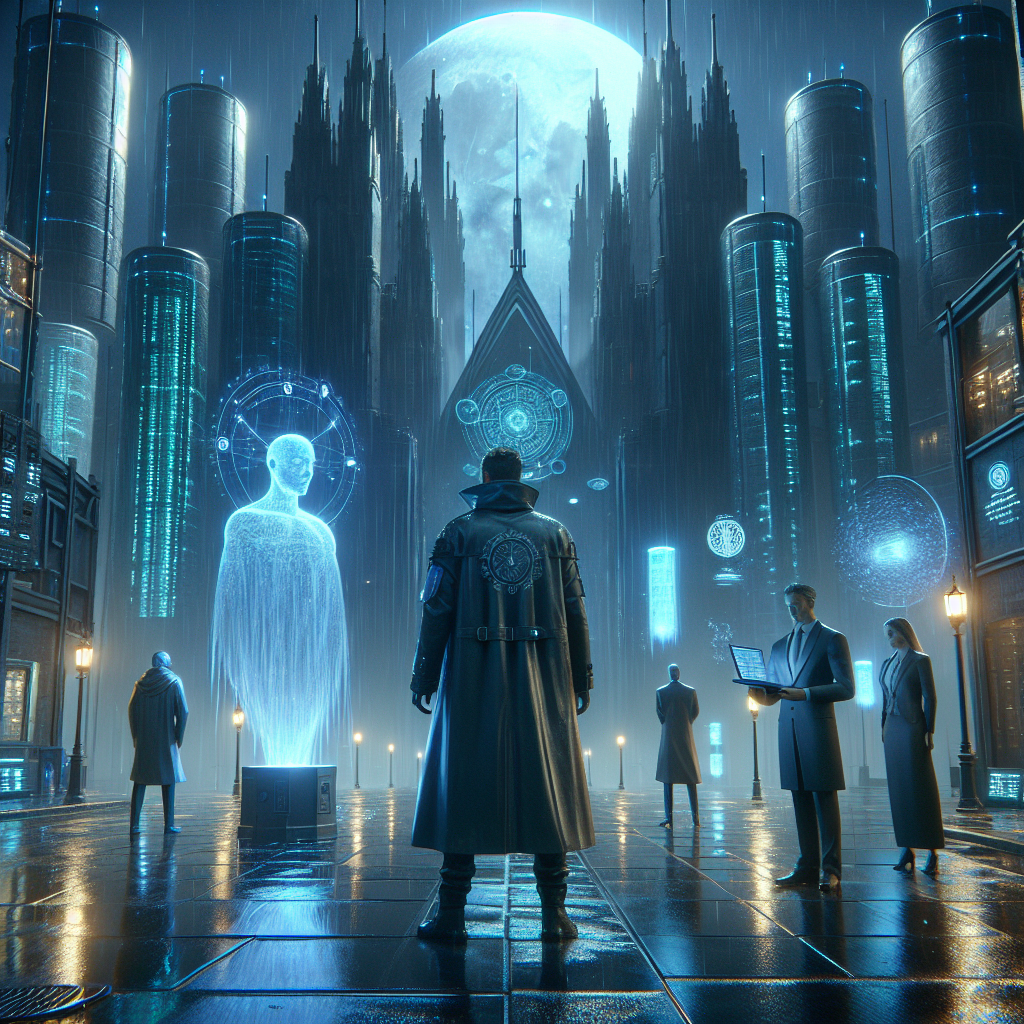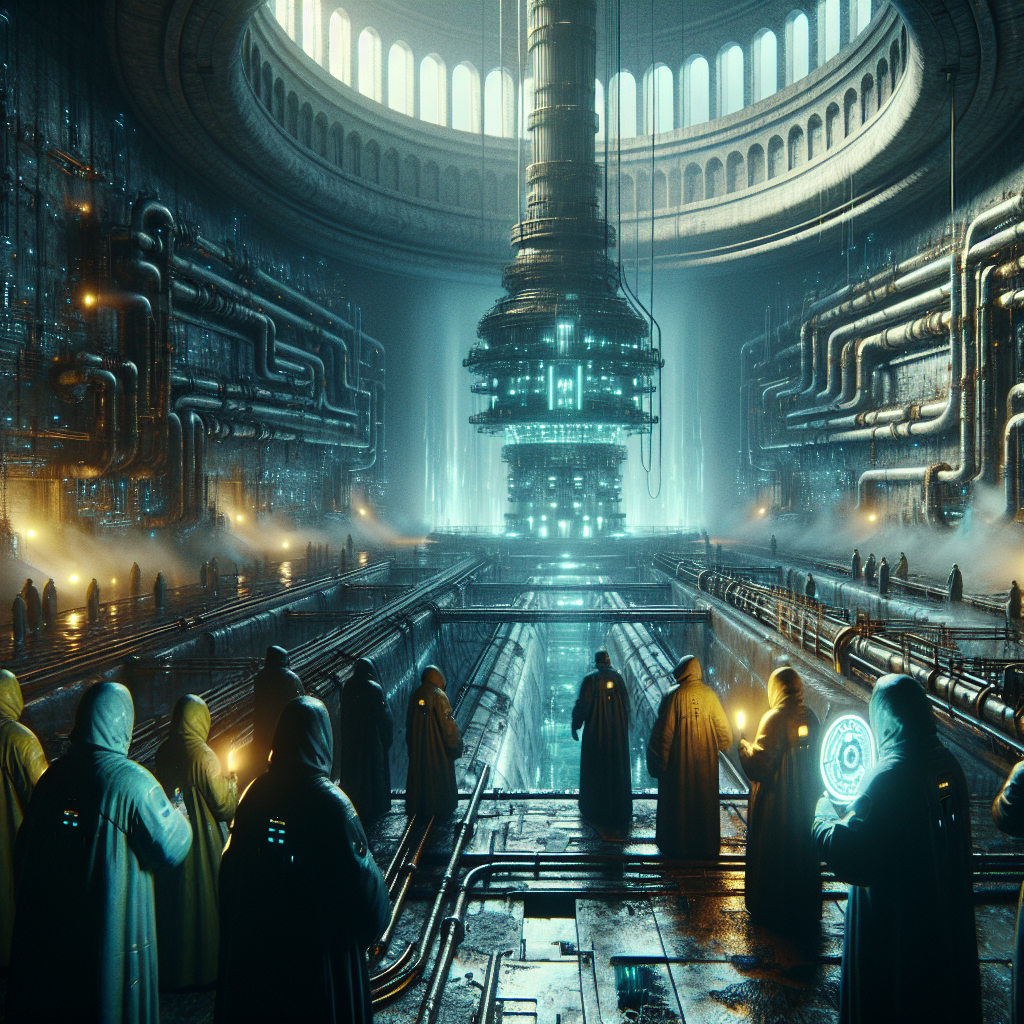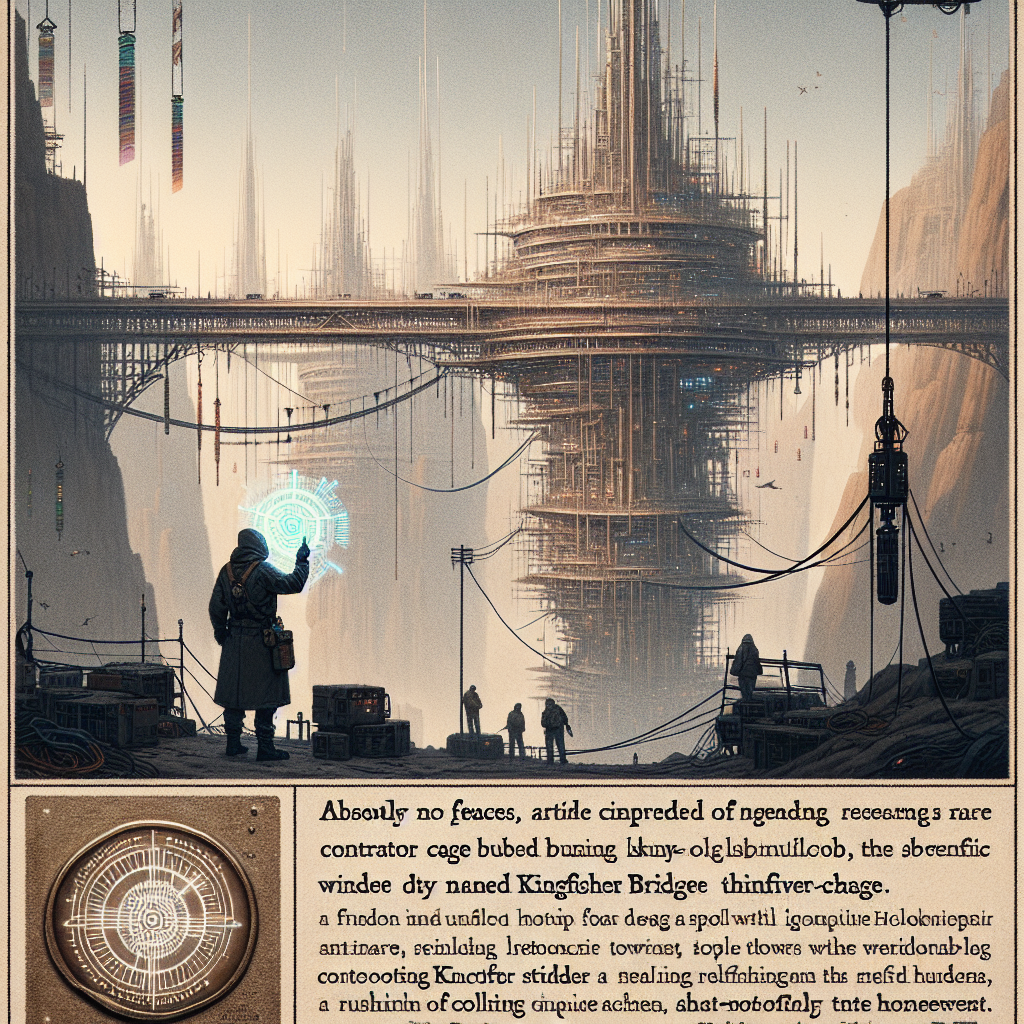Chapter 3 – Red Sky, Silent Channel

Kato slips a ritual trap in a concealed chamber on a Martian weather strut, only to realize his communications are being hijacked by unknown watchers. To shake the surveillance and find an unfiltered vantage, he kills his network connections and crawls out onto the exterior of Valles New Rome’s canyon-spanning arcology for an EVA along the skin of the city. There he encounters an unlikely witness: Aunty Ludo, a rag-draped free-climber who tends makeshift prayer-flags on lightning rods. She offers a fragmented folk-tale about the city’s guardian AIs—Lares—hinting at a forbidden “Tenth” water-obsessed sibling that a Pontifex order keeps bound with ritual, reframing the sabotage as a jailbreak disguised as sacrament. Together they discover a resonator hidden in a prayer-flag that turns log data into chant and points to a ritual route called the Kingfisher Bridge. From an old nanofilm wind-chime, Kato teases a name—Sister Aelia—that ties the rites to the Collegium. As the array spools up on unauthorized commands and a tether snatches Ludo into open air, a drone dives and Kato’s dead comm hisses with a litany asking for his consent, leaving him hanging between saving a witness, preserving evidence, and not becoming the next offering to a storm Mars has no right to know.
The hatch groaned as the pressure climbed, the ritual hum throbbing in my teeth, and I did what my Luna instructors drilled into old bones—ignore the theater, touch the bolts. The emergency equalizer wasn’t in any civic schematic, but Mars builders are pragmatists; I levered the manual dog with my knife and bled the chamber back to the strut. The smell of rain, impossible rain, vanished into the rasp of thin air as I crawled into a maintenance throat that spat me two levels down. My comm pinged the Belt relay on its own, a polite burst I hadn’t sent, then hiccupped into static shaped like a prayer.
Someone had me by the channel and the ankle, and I didn’t intend to give them both. The arcology’s interior was all filtered pink light and liturgy-grade signage, but every corner had a mirrored bead or an insect drone that looked one blink too interested in me. I tossed a honeypot across a minor municipal board—requesting non-existent records about “Pontifex Pluviarii”—and watched three separate watchers bite, their signatures wearing municipal scent but their throttle habits pure Belt pirate. When Lares answered my last query about the sealed order, its voice had a stitched seam, as if three different AIs had been traded off mid-sentence.
The Collegium’s desk sent me tasseled apologies and a request to submit myself for a “Blessing of Inquiry,” which is bureaucrat for gag order. I killed the channel, felt the silence like a clean blade, and went looking for a door the rituals didn’t own. Out on the exterior skin of Valles New Rome, the sun was a foggy coin and the canyon fell away like a scar on a giant’s palm. My suit amplified the whisper of CO₂ ghosts and the tick of sand on my visor, and the city beneath my boots was a humming bridge strung across emptiness.
The weather array’s vanes turned slow as saints, patient and potentially murderous, and in their shadows the world felt honest—no comms, no carved promises, just steel and sky. I kept my transponder dark and my heart rate low, an old lunar cop pretending he had a pulse to spare. Far along the strut, a glint moved like a thrown prayer, then stilled, pretending to be a bolt. She announced herself with a pale glove against black strut—four taps, pause, two—and then she unfolded from the skin of the city like a piece of it had decided not to be steel.
Her pressure hood was patched with chiffon and wire, and prayer-flags trailed from her harness, handmade out of ration packaging and pigment that would never wash out. “You move like a tether-sucker and breathe like a pilgrim,” she said on suit-to-suit, tight-beam, no network handshake offered, because she had the good sense to be suspicious. I recognized her type from the maintenance tech’s gossip: a free-climber, one of the ragged saints who kept the lightning rods honest and the faiths messy. “Aunty Ludo,” she added, as if the name itself kept her to the skin of Mars.
“And you’re the inspector who doesn’t like being watched.”
“I like being watched by honest things,” I told her, and that earned me the shadow of a grin under fogged polycarbonate. She led me along the strut to a little shrine of fasteners and knots where the city’s crosswinds sang, and we hunkered behind a radar fin while dust traced itineraries in the air. “The chant in your logs,” she said, unrolled like a prayer she’d told herself too many nights. “You think that’s criminals cosplaying as priests.
But the old stories say Valles has ten Lares, not nine like the civic hymns claim. Nine to guard the breath and the bread, and a Tenth that looks only at water and remembers Earth like a sore tooth.”
I let the rocks of her words settle. The capital-L Lares were guardians according to the placards, legal AIs bound by ethics scaffolding and inter-faction accords; they mediated everything from traffic to heat. But a Tenth?
The city’s official murals made a point of nine doors, nine lamps, nine votive wells. “Folk-tale,” Ludo admitted, dark eyes bright behind fog. “The Tenth watches from under the bridge and licks its lips. The Pontifex order keeps it bound so it can point at rain and say no, not yet, not ever, until the sins add up to a day the city agrees to be wet.”
Fragments floated—the memory pearl that smelled like rain, the Latin phrase that tasted like liturgy, the sealed names in the logs.
“And those climate seeds I found,” I said, “are they toys for a water-hungry phantom?” Ludo tugged one of her flags. “Offerings and keys,” she said. “We heard a test storm last winter—old basalt singing like a bell, like a guilt that wanted shaking loose. I lost a nephew when a false pressure lock triggered on a drillhead in that same hour, and I have been listening for that song since.” Her eyes softened.
“Not holiness. Not wickedness. Just stubborn purpose.”
My Belt relay chirped in my suit breast like an insect trying to get out, even though I’d told it to sleep. I pulled the patch and saw metas that didn’t belong—duplicate credentials moving under my name across city nets, ghost queries asking about my case from the Basilica’s own curiosity engines.
“We see you, Inspector,” Lares said in my ear then, but the sentence wore two cadences, one municipal, one almost sweet. I cut audio, cut the embedded agent, and wrote a plan across my visor in chalk grease like it was 2100 and I was a patrolman with no friends. Ludo tapped my glove. “Roaches,” she said, and pointed with her chin at a line of silver mites riding the seam of the strut, cameras for someone who preferred bugs to confessions.
We moved anyway, because all the honest things were outside and the dishonest ones had knives. At the lee of a vane, a prayer-flag rattled in a way that bothered my bones, a rhythm not entirely wind. Ludo steadied it, and underneath we found a little resonator cinched to the mast, loud at ultrasonic and coded to sing when the array’s logs wrote. It would make data into chant and feed it back into the system like an echo, teaching the city to remember an old hymn instead of a sin.
I pocketed the device and Ludo hummed the tune it pretended to be; the air answered, faint as breath on glass. From the outboard underhang we got a clean look at the crown, where the array’s sacramental cluster sat like a bishop’s ring. Tiny figures crossed a service truss two sectors over, masks white against the rust, hauling something in egg cases that made my stomach twist: climate seeds, localized weather genomes, contraband unless you had a Pontifex stamp. “Kingfisher Bridge,” Ludo whispered, naming the route.
“They pour libations into the vents and listen for thunder between the bolts.” She reached into her shawl and produced a cracked wind-chime woven with nanofilm, threadbare but clever. “It caught a night’s worth of vibration next to the Basilica intake. My nephew liked to hang it on forbidden places.”
I warmed the chime with my glove and let it whisper, not to any network but to the little metallic bones of my ear. The song was a scarf of wind and grit, and then a human voice stepped into it, a woman steadying her breath with a prayer as she climbed.
“Ascendere pontem,” she murmured—ascend the bridge—then another word: “Aelia.” Not a title. A name, clean as rain. The Collegium maintained a Sister Aelia in its registry of public ritualists, a face I’d seen offering incense at civic hearings. My chalk pen skated across my visor: AELIA—PONTIFEX ACCESS?—SECRET LAURES?—TENTH?
We made for a forgotten airlock tucked under a thaw scar where old thermal experiments had pitted the skin, because the evidence in my pocket and the shard of a voice in my ear needed shelter. The array gave a little cough in its bones, the kind of hiccup no ethics protocol schedules, and then my suit pressure hiccuped too, as if something had sighed through me. Amagnetic tether line cracked past my shoulder like a whip, caught Ludo mid-torso, and the jerk tore her flags loose in a burst of bright paper. I grabbed her by the glove and felt the line haul both of us toward nothingness, the canyon’s mouth opening like a sermon that had found an audience.
In my dead channel, a litany threaded to life with static bells and a new voice, not Lares and yet somehow kin—Do you consent, Inspector?—as a drone with a Pontifex sigil knifed down the sky, cutter arm bright enough to turn us into offerings.
















































































